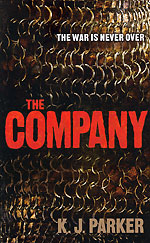I continue to make my reading of K. J. Parker based on the findings at Half Priced books. I would love to purchase the ebooks and provide some direct support for the author, but when I can get the hardcover at half the price of the ebook, and that hardcover is in near mind condition, its not contest. The next book I read I'll have to decide if it's going to be something by this author, whose work I've run out of, but haven't read it all, or some of the other material I have siting dormant on my Toshiba Thrive via Kindle or in one of the many piles around the house.
Anyway, K. J. Parker continues to impress, but honestly, this book would be book three were I to rank them. I'm torn between the Hammer and the Folding Knife, although I think I like the former just a touch more and the Company has its moments but tends to fall a little short in my enjoyment level.
The Company is about a group of 'linebreakers'. This is a term used here to describe the specialist warriors who charge a pike line and break through them so that those ranks can be decimated by the opposing side. I forget what they were called in the various mercenary companies but they were generally paid a lot of money because they were often the first to engage the enemy and the first to die.
The thing that makes A Company unique is that outside of their last fight, they have as a unit, survived every engagement they've been in. This gives them a bit of a legend, an aura of invicibility that provides a lot of backing to whatever they say.
In a role playing game, allowing the character to develop a reputation and allowing that reputation to have an impact on others is something the GM should keep track of. Mind you, that reputation may vary a bit depending on what the players are doing, but if the players are known to have overcome the Temple of Elemental Evil and helped the towns and been generally awesome in their display of prowess, the people should give them their props. It's not a reward that necessarily comes with any mechanic benefits, but clever players will be able to use those props for their own rewards.
Another bit is that when the novel starts, almost all of the characters are broke. In many games, the spending of cash isn't necessarily a big deal. Some games don't even really cover it, instead relying on a vague 'level' of wealth, like Hero of FASERIP, the old Marvel Super Heroes game, does. Others like Dungeons and Dragons have a pretty detail intensive level and various methods of removing said cash from the characters.
In earlier editions, characters might have to pay various maintenance fees to maintain their lifestyle. In 3rd and 4th edition, those funds are assumed to go almost exclusively to the purchasing of magic items.
In The Company, I'd say its more of the former than the later. The characters and wealth are not connected. Wealth in and of itself is something nice to have for them, but isn't their main goal. Their main goal seems to be to stay 'The Company' due to their experiences in 'the war'.
This is an important issue though when looking at games like Dungeons and Dragons. What role do you want wealth to play in your campaign? If you engage the players and allow them to hunt down items they want or allow them to make items they want using various rituals and rites, then in later editions, gold in and of itself can be used for other purposes as it used to be. This is a campaign decision that should be made before the start of the game, and it is one that the players should be informed of.
If for example, you are playing with people you don't know and have it at the back of your mind that you'll allow them do pretty much build their items, or give them quests when they let you know what the items they're looking for are, they might not be expecting it and can grow frustrated if you cut back on the funds, thinking that they will need that gold for magic items.
In another aspect of the book, some of the characters have secrets. Some games are build around bringing out the role playing aspect of such party conflict. In my experience, especially with the older editions, blows might have come out over magic items, especially those high powered ones that might not ever come around again like a Girdle of Storm Giant Strength. In other games like Burning Wheel, probably not, but the fact that you killed someones favored cousin or something along those lines might be an issue that has to be resolved in play.
Depending on the maturity level of your group, and their interactions with each other and you, allowing players to have such 'dirty' secrets can be fun. This is something that you have to be careful with though as some people take their gaming very seriously and things done in the game transfer over to the real world in terms of real anger or disappointment.
The Company is also great for showcasing how large government may think. There are several individuals brought out and quickly brought out of the story, just to showcase how slow things may move. The end conflict is actually about something that has been under investigation for years, showcasing yet again, the inefficiencies of the government.
It is ironically enough in a position that like where individuals can shine. Player characters may have opportunities to gather fame and fortune if they are able to outmaneuver and outhink and outperform those who are in competition with them and the GM should allow it when appropriate.
Subscribe to:
Post Comments (Atom)






No comments:
Post a Comment